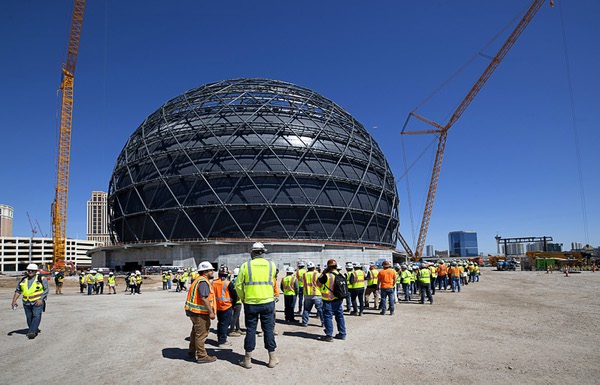Iris Ramos Jones says she knows the struggle of immigrants trying to build a life in the United States.
She left Ecuador 10 years ago and landed in Nevada, eventually finding her niche in real estate. She was appointed in September by Gov. Joe Lombardo as director of the Nevada Office for New Americans, which was created by a bill in the 2019 Legislature to promote opportunities for immigrants, refugees and aspiring Americans to thrive in Nevada.
“I truly believe that, once an immigrant is given an opportunity, we’re going to take it and we’re not going to let it go because we appreciate those opportunities even more so than people that were already here,” said Ramos Jones, who on Tuesday joined local leaders in sounding the alarm on a shortage of workers in blue-collar industries such as construction and encouraging lawmakers to expand work authorization for immigrants.
The discussion was cohosted by the Latin Chamber of Commerce, whose president and CEO Peter Gúzman said, “These discussions can lead to policy changes that benefit all parties.” The event was also hosted by the bipartisan American Business Immigration Coalition Action (ABIC Action) and included local leaders in construction, agriculture and legislative.
How severe is the blue-collar worker shortage? More than 100,000 people are needed to fill open construction jobs in Las Vegas, said Amanda Moss, senior director of government affairs at the Southern Nevada Home Builders Association.
Nationwide, an estimated 1.9 million construction workers will leave their jobs for other industries in 2024, and the industry needs to attract a projected 501,000 more workers on top of their usual hiring to meet labor demand, said Associated Builders and Contractors, a national group that promotes the industry.
Those positions could be filled today if the federal government took steps to open the work authorization process for immigrants, Moss said.
It’s gotten so difficult for the construction industry that “lots of major, key contractors” are having to turn down work due to a lack of employees, said Ann Barnett, CEO of the Nevada Contractors Association.
One of the biggest reasons for this dip in workers is an aging population opting for retirement, combined with increased interest from younger Americans in obtaining a college degree, said Donnie Gibson, CEO of the Las Vegas contractor company, Civil Werx.
“We have to look at solutions to bringing in immigrant labor that does have a propensity to work hard and wants to swing the hammer, because those employees are just not there,” Moss said.
About 18.4% of Nevada residents in 2021 were born outside of the United States, almost 13% live with at least one immigrant parent, and roughly one-fifth of Nevada’s labor force is made up of immigrants, the American Immigration Council said. Roughly 144 immigrants a week come to Nevada, Ramos Jones said.
Throughout the nation, immigrants are more likely to be working-age, with 79% of them being between 16 and 64 years old.
This means they’re more likely to be active in the workforce and contribute economically as consumers and taxpayers — immigrants in Nevada paid $1.2 billion in state taxes and local taxes in 2021 — despite not being able to take advantage of all government services.
Immigrants can be sponsored by their employers for permanent residence or apply for visas that allow them permanent or temporary employment within the U.S. through programs such as the H-1B visa for specialty occupations or the J-1 physician visa. The U.S. may grant up to 675,000 visas annually for family, employment and diversity, according to the National Conference of State Legislatures.
James O’Neill, director of legislative affairs at ABIC Action, said one solution could be expanding work authorization through a power called parole. That’s when the U.S. Department of Homeland Security “allows an individual, who may be inadmissible or otherwise ineligible for admission into the United States, to be paroled into the United States for a temporary period,” according to United States Citizenship and Immigration Services.
Sen. Dick Durbin, D-Ill., who chairs the Senate Judiciary Committee, which oversees immigration issues, is calling for President Joe Biden to use his authority to expand work authorization for the spouses of U.S. citizens. Expanding work authorization to the roughly 1.1 million undocumented people with citizen spouses would allow them access to jobs that “could be transformational to whatever industry they want to work for,” O’Neill said.
O’Neill also said he wanted to see the parole program expanded to immigrants that have been in the U.S. for over 10 years in an attempt to retain more workers.
“Late last year, the U.S. Chamber of Commerce published a report that said if every single person who’s currently on unemployment got a job today, there would still be about three and a half million open jobs that needed to be filled, and so what we have is a numbers problem,” O’Neill said. “Any sort of reasonable solution to that problem involves adding people to the workforce, expanding access to work authorization so that folks can fill the critical roles that we need them to.”

